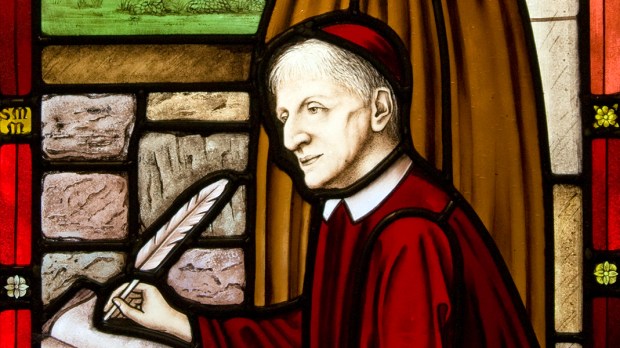Cardinal John Henry Newman (canonized a saint by Pope Francis last fall) spent his life searching for Christ’s living water. As a young man, Newman reports that he encountered God, “not as a notion, but as a reality.” Soon after, he was ordained an Anglican priest. For 20 years Newman continued to seek and serve the God he came to know and love. After extensive studies in the history of the Church and the theology of Christian denominations, Newman decided to become a Catholic.
Armed with the gifts of extraordinary intellectual ability and a deep religious faith, Newman tirelessly sought God. For Newman, “growth is the only evidence of life.” Turning over time and again the great questions of religion, Newman found himself needing to grow and to change often on this side of eternity. Recognizing that Christian life can never be stagnant, Newman writes, “here below, to live is to change. To be perfect is to have changed often.” In recognition of Newman’s theological achievement, Pope Leo XIII named him a cardinal in Newman’s last years of life.
Newman’s life, extraordinary as it is, was not without tremendous difficulty. The consequences of his conversion to the Catholic faith were severe. Relationships with his family and friends were strained and difficult because of his decision to embrace union with Rome. The Oxford theological circles he had been a part of fractured. How could Newman’s own heart not been tempted to cry out, “Why, O Lord, have you brought me out of Egypt?”
You see, like the Israelites of old, Newman had been led first through a series of sufferings and purifications, before entering the peaceful life he would know when he founded the Catholic religious community at the Birmingham Oratory. Newman and Israelites alike are modeling for us the arc of the spiritual life. We pass through testing and trial so as to be made ready for glory.
The temptation, of course, is to raise our eyes to God and doubt the work that He is doing. Like the Israelites we may long for things “as they used to be.” Uncertain of where God is leading or bored and dispirited by the work the Lord is doing, we appear apprehensive while the Lord continues to lead us through the desert. The response we have to muster, however, must not be murmurs or complaints against God, but a willingness to grow, to change, like Newman. Choose Newman’s way of devotion and faith, rather than the way of grumbling and uncertainty.
Not only does Newman show what it means to be led through the desert, he teaches how, like the woman at the well, to encounter Christ. Perhaps the most amazing line in this Gospel passage comes at the end, “We no longer believe because of your word; for we have heard for ourselves …” You see, the Samaritan woman was so changed by her encounter with Christ, that she immediately began to evangelize. She proclaimed that Jesus was the Christ, the one long-awaited by Israel.
Newman too, was devoted to this proclamation. For 40 years after his conversion, he dedicated himself to theological study and preaching. Like the woman at the well, Newman encountered Christ and continued to share that encounter until the day he drew his dying breath.
How is it that this flame of faith never grew cold? Why, unlike so many other Christians, was Newman able to remain continuously devoted to Christ? Why do some grow indifferent, unable to see the work God is doing in their lives? Newman replies,
But why is this? Why do you so little understand the Gospel of your salvation? Why are your eyes so dim, and your ears so hard of hearing? Why have you so little faith? So little of heaven in your hearts? For this one reason, my brethren, if I must express my meaning in one word, because you so little meditate. You do not meditate, and therefore you are not impressed.
Meditate. For Newman, meditation simply consists in calling to mind, over and over again, throughout the whole of the day, what God has done. Think of Christ’s sufferings. Think of the Lord’s mercies. Think of Jesus’s teaching.
To think of Christ, to be united to him, is to draw life from living water. Meditation, and meditation alone, will continue to nourish and expand the graces given to us by Christ. To call to mind the wonders and works of God will fill us … forgetfulness will leave us empty.
John Henry Newman’s tomb bears the inscription: Ex umbris et imaginibus in veritatem (Out of shadows and phantasms into Truth). The darker things in life have the power to trap our hearts. They can weigh us down and hold us back. The solemn truth proclaimed by the Gospel every Sunday is that these darknesses are but shadows. Cling to Christ that you may live! Call to mind the Light and step out of shadows into the Truth!

Read more:
What memory has to do with learning how to pray

